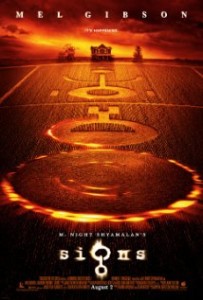“Do you think this is the end of the world?”
https://www.imdb.com/title/tt0286106/?ref_=fn_al_tt_1
So begins the central discussion in the 2002 movie Signs.
“People break down into two groups,” Mel Gibson’s character begins.
“Group number one view events as if someone is up there, watching out for them.”
“Group number two view events as pure luck, a happy turn-of-chance.”
“Group number two believes that deep down, whatever happens, they’re on their own.”
“Group number one sees events as a miracle. Whatever happens, there will be someone there to help them.”
“What you have to ask yourself is, ‘What kind of person are you?’“
Mel Gibson plays a pastor who jettisoned his trust in God after his wife was killed. In this scene, the pastor and his brother discuss how people view the current “invasion” of alien ships. Some see it as a miracle, others, the end of the world.
I thought of this movie yesterday when I read T. M. Luhrmann’s article “Faith vs. Facts” in The New York Times.
Luhrmann points out the essence of M. Night Shyamalan’s movie: how we live is based on what we believe.
“Facts versus faith” is the way Luhrmann sets up her article. But her article only points out her assumption.
If facts are limited by finite boundaries will infinite possibilities ever be considered?
Here are just a few observations which unpack Luhrmann’s assumptions, her belief. [1]
(1) Notice that Luhrmann, as an anthropologist, begins with the precondition that faith and facts are separate from each other.
(2) Her next step is to assume that human commitments are either verifiable by scientific approaches or revelatory attribution. [2]
(3) She uses “scholars” who begin with her same assumption.
(4) Their “studies” identify differences in how people think based on scientific inquiry alone.
(5) Her first paragraph belies her conclusions even before she gets to the argument (“How could anyone NOT . . . “).
(6) And do not miss the emphasis on “mind-set.” The way the word is hyphenated seems to speak volumes about her entrance into the discussion: perhaps she wants to make sure that the two words do not become one (since she seems to desire human reason, “mind,” to be separate from someone’s “set”).
Since the 1990’s I have been teaching my students this four-fold view of how people approach life:
-
Frames are assumptions people make about their ideas, pronouncing, “This is where belief begins for me.”
-
Facts are evidences of ideas people point to telling, “This is why I believe.”
-
Faiths are ideas or worldviews for which people declare, “This is what I believe.”
-
Feelings are the emotions or reactions people express about their ideas shouting, “This is how I believe.”
I DO find great agreement with Luhrmann in her second paragraph: “People process evidence differently.”
This sentence proves her point. Luhrmann processes her whole approach to this article based on her own mindset.
“Which type of person are you?”
THAT is the issue. What frames our person will instruct how we view life.
Mark has been teaching these basic concepts to his students since the 1990’s. Some of this material was the basis for the first lesson in the Rewired series. Dr. Mark Eckel consulted with Charles Colson to create the content for the 12 lessons in the Rewired curriculum in 2005-06.
[1] The whole article is a case study in differences between assumptions. There are many more observations to make.
[2] “Verification” or “How can I trust something to be true?” is really a Christian concept. See Brian Auten’s article “Can the Christian Know?”


More solid wisdom from Dr. Eckel.
It reminds me of a conversation I had quite a few years back with an atheist friend of mine. When I told him what he thought about my belief that science could be used to support the existence of God, his response was, “I would say that you’re just looking at science through a Christian lens.” Our friendship eventually ended on bad terms when I challenged his views, perhaps not the most graciously, about meaning and purpose…
One thing I wish I had managed to respond with in regard to his statement was this: “Do you not look at science through a Naturalist lens?”
Unfortunately, philosophical Naturalists have hijacked science in the name of supposed “objectivity” and have conflated science with Naturalism. That’s the problem. Science classrooms aren’t JUST teaching science. They’re teaching philosophical Naturalism, which is a worldview–that ultimately must be taken on faith. Don’t believe me? Consider the multiverse. No solid scientific evidence for it whatsoever. But it is believed.
Gerald Rau wrote a good book titled Mapping the Origins Debate, a book in which he shows how everyone has to work with the same evidence and everyone interprets the data based on his/her presuppositions.
Thanks for the dissection of the article. You have trained me to do the same thing for myself, and I am ever-thankful.